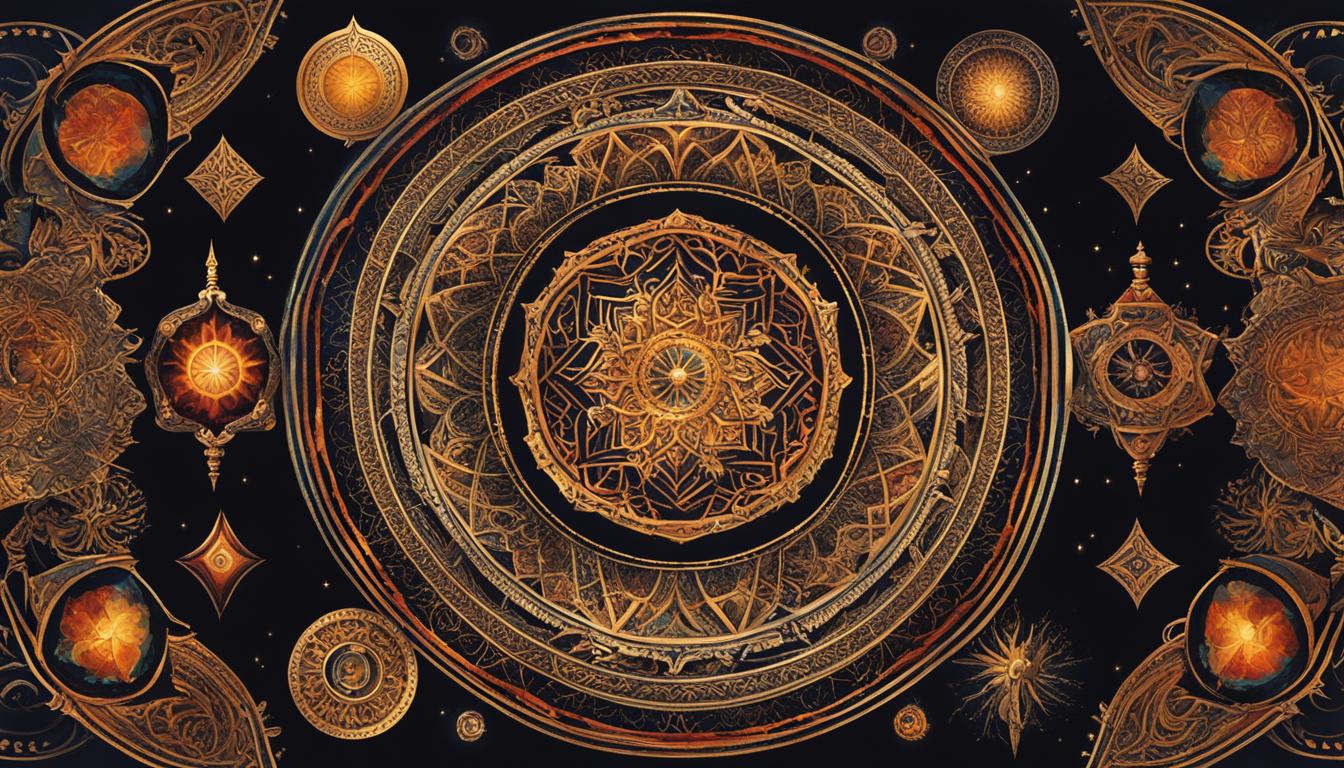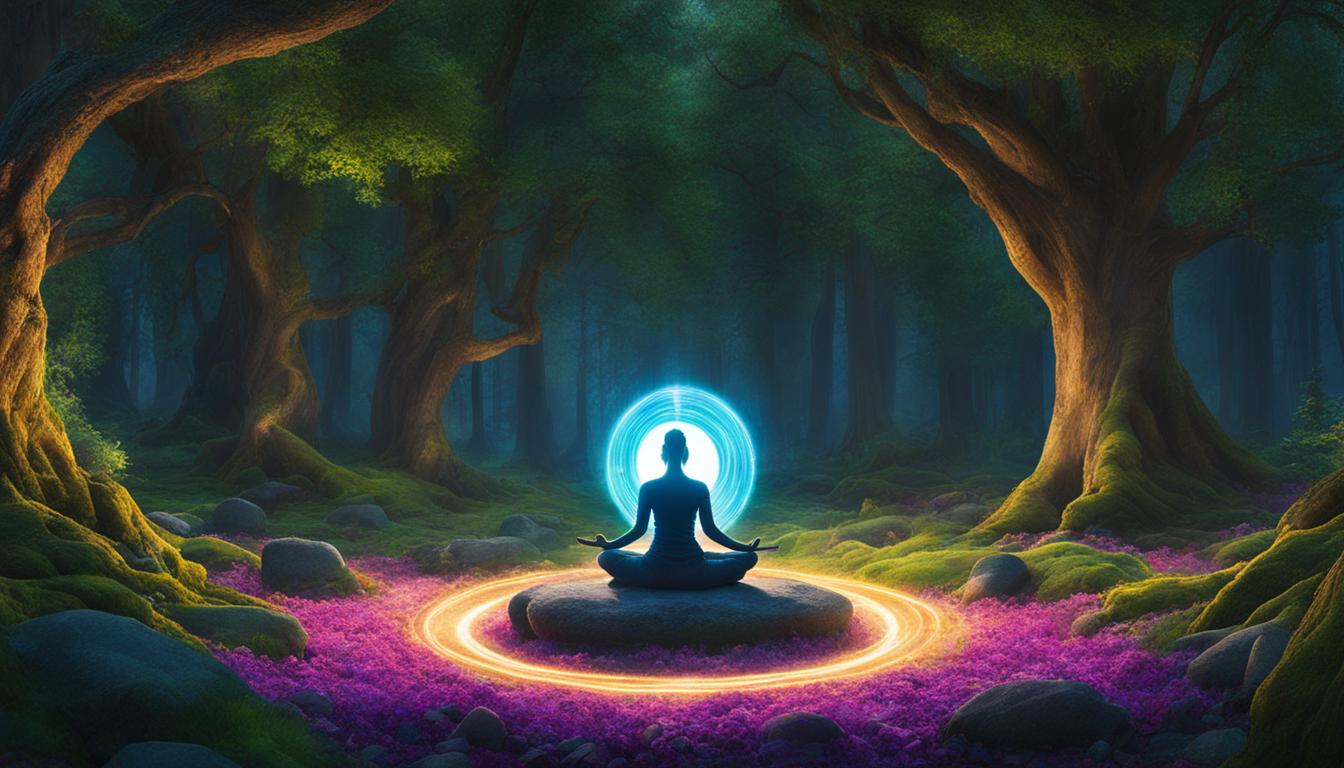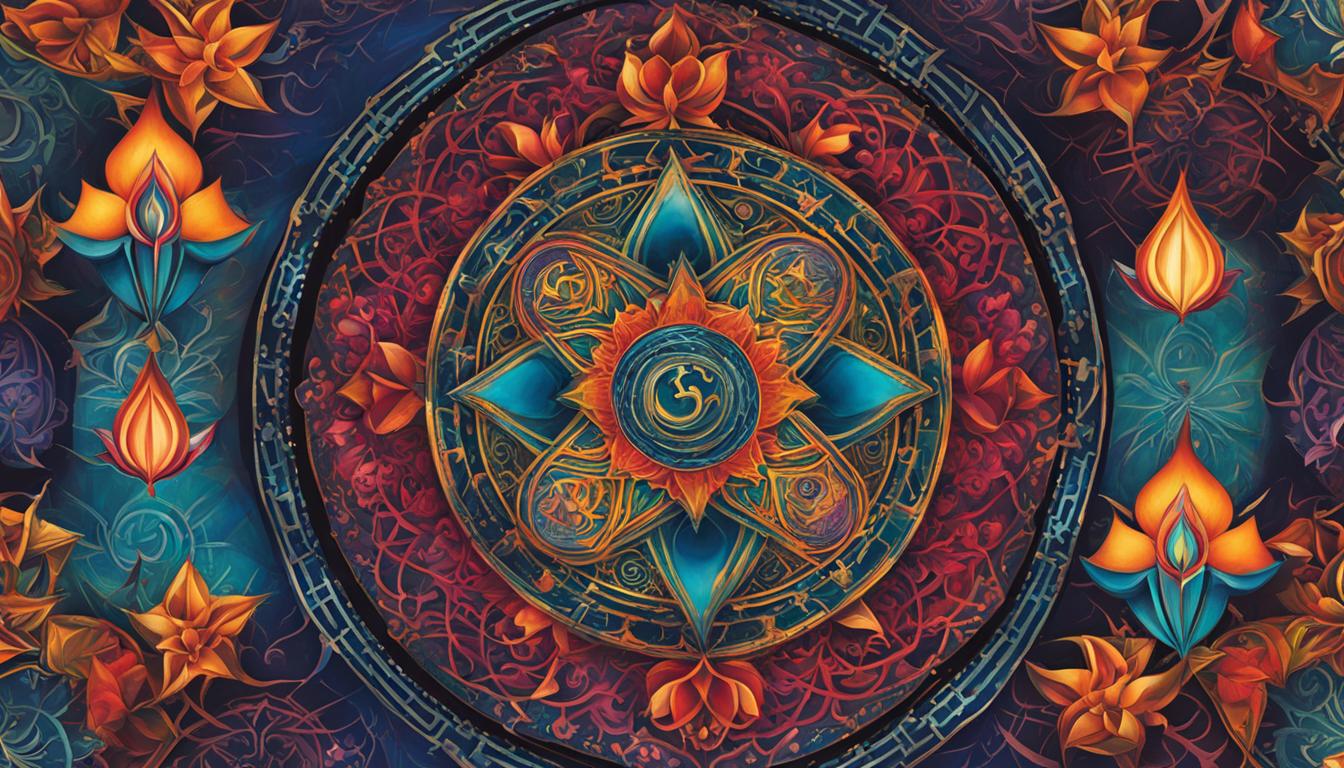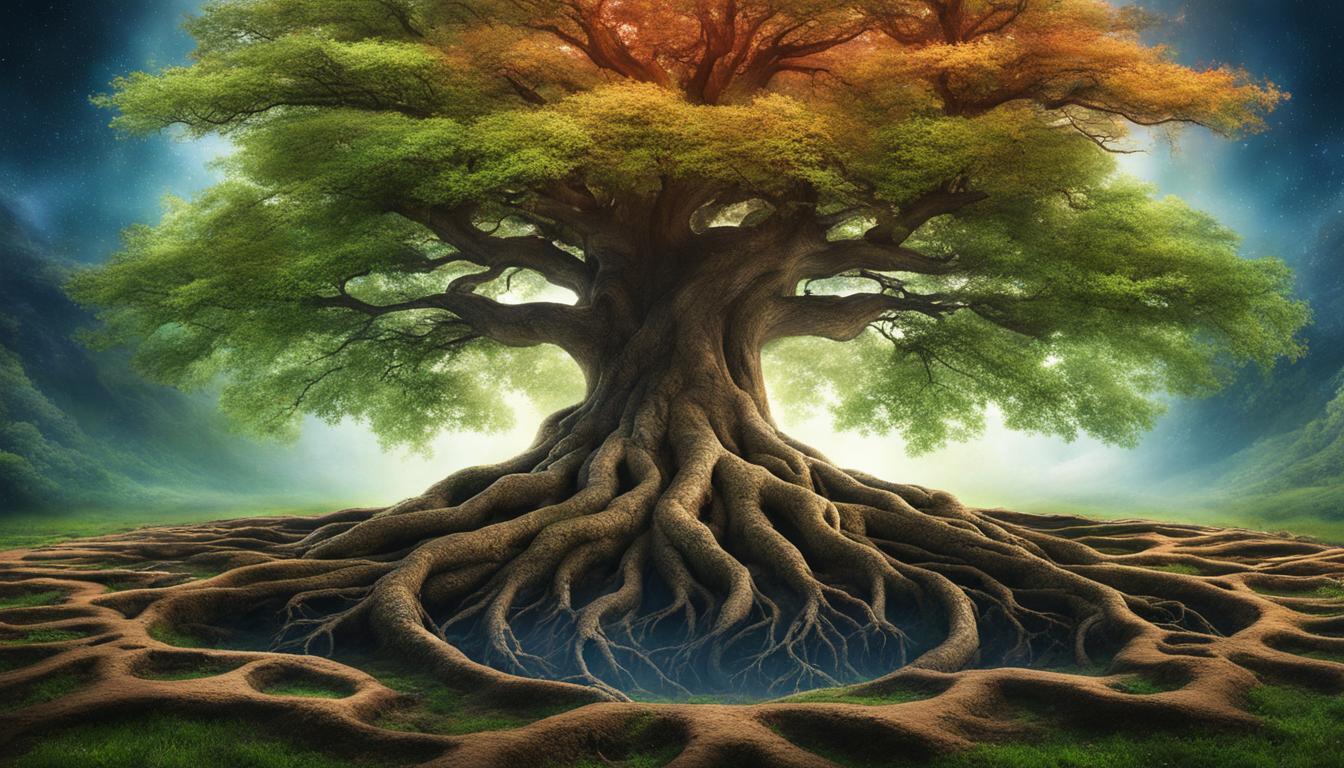Embarking on a journey of true spirituality is a powerful path towards self-discovery, inner peace, and holistic wellbeing. It is a soulful journey that transcends religious boundaries and embraces universal principles of love, interconnectedness, and higher consciousness. Through practices like meditation, mindfulness, and mindful living, individuals can unlock the transformative power of true spirituality and forge a profound connection with the divine.
Key Takeaways:
- Cultivating true spirituality leads to spiritual growth, inner peace, and holistic wellbeing.
- Practices such as meditation, mindfulness, and mindful living are key elements of true spirituality.
- True spirituality transcends religious boundaries and embraces universal principles of love, interconnectedness, and higher consciousness.
- Embracing true spirituality is a soulful journey of self-discovery and a deeper connection with the divine.
- Through true spirituality, individuals can lead more meaningful and fulfilling lives.
Traditional Religious Practices: The Pillars of Spiritual Exploration
Traditional religious practices have long served as the foundation of spiritual exploration and growth. These practices encompass a wide range of rituals and ceremonies that hold deep meaning and significance for individuals and communities alike. They provide structure, guidance, and a sense of belonging to those seeking a deeper connection with the divine.
Embracing traditional religious practices allows individuals to engage in sacred rituals and ceremonies that mark significant life events. These rituals, whether it be a baptism, a bar mitzvah, or a wedding, foster a sense of purpose and belonging, creating a space for reflection, celebration, and spiritual growth.
The sacred texts associated with traditional religious practices, such as the Bible, the Quran, or the Vedas, hold a profound significance. They provide moral guidance, wisdom, and insights into the nature of divinity. These timeless texts serve as a source of inspiration, offering individuals a deeper understanding of their faith and a connection to their spiritual heritage.
Furthermore, community gatherings play a vital role in traditional religious practices. Whether it is attending weekly church services, congregational prayers at a mosque, or temple visits, such gatherings foster a sense of community, unity, and fellowship. These moments of collective worship, reflection, gratitude, and communion with a higher power strengthen one’s spiritual journey and provide support along the path.
“Traditional religious practices offer a framework and a roadmap for spiritual exploration and growth. They provide individuals with the opportunity to engage in profound rituals, draw wisdom from sacred texts, and find solace and fulfillment within a vibrant community.”
Through traditional religious practices, individuals can tap into the rich heritage and wisdom of their faith, finding purpose, guidance, and connection in their spiritual journey. These pillars of spirituality continue to be a source of solace, inspiration, and growth for those seeking a deeper understanding of themselves and the divine.

The Evolving Landscape: Modern Non-Religious Spiritual Practices
In the contemporary world, traditional religious doctrines are giving way to more fluid and individualistic spiritual practices. Modern spirituality encompasses practices such as meditation and mindfulness, which go beyond relaxation techniques and offer deep self-awareness and inner peace. By quieting the mind and focusing on the present moment, meditation helps individuals develop a heightened sense of clarity, intuition, and connection to their inner selves. Mindfulness, on the other hand, involves cultivating a non-judgmental awareness of one’s thoughts, feelings, and sensations, allowing individuals to develop a greater sense of acceptance and compassion for themselves and others.
Another significant aspect of modern spirituality is the connection between nature and spirituality. As individuals seek solace and inspiration in the natural world, they find a profound sense of awe and wonder that transcends the boundaries of religious dogma. Whether it’s hiking through majestic mountains, meditating in a serene forest, or simply connecting with the beauty of a sunset, nature becomes a gateway to experiencing the divine. It reminds us of our interconnectedness with all living beings and the universal principles that govern existence.
In this evolving landscape, embracing universal principles has become essential for modern spirituality. These principles, such as love, compassion, and interconnectedness, serve as guiding lights in an increasingly divided world. They transcend religious and cultural boundaries, offering a common ground for individuals from diverse backgrounds to come together in unity. Universal principles provide a moral compass and a framework for ethical decision-making, reminding us of our shared humanity and the importance of treating one another with kindness and respect.

These non-religious spiritual practices, rooted in modern spirituality, provide individuals with the tools to embark on their own unique soulful journey of self-discovery and connection with the divine. By incorporating practices like meditation and mindfulness, cultivating a deep appreciation for nature, and living in alignment with universal principles, individuals can uncover their true spiritual essence and experience a profound sense of well-being, purpose, and fulfillment.
Crafting Personal Narratives: Unique Spiritual Paths
Each individual’s spiritual journey is as unique as their fingerprint. In crafting their own personal narratives, individuals blend elements from various traditions and philosophies to create bespoke spiritual paths that resonate with their innermost beliefs. “Every spiritual journey is a deeply personal exploration, fueled by the desire to uncover one’s true self,” says Sarah Thompson, a renowned spiritual mentor.
For example, some may find serenity and clarity through silent meditation retreats, while others feel a profound connection with a higher power through immersing themselves in nature. These personal narratives allow individuals to follow their intuition and combine practices that genuinely resonate with their souls. They are not bound by the constraints of organized religion or societal expectations, but rather by an authentic quest for spiritual truth and meaning.

By drawing from multiple traditions and weaving together a rich tapestry of beliefs, individuals shape their spiritual worldview and embark on a deeply personal and meaningful soulful journey. As Dr. Maya Patel describes it, “Crafting a unique spiritual path is an act of self-empowerment, a declaration of one’s inner voice and wisdom.”
These personal narratives are not fixed or rigid; they evolve and adapt as individuals grow and transform. They provide individuals with the freedom to explore various spiritual practices, philosophies, and experiences, guiding them towards a deeper understanding of their place in the universe.
The Power of Integration
One of the remarkable aspects of crafting personal narratives is the power of integration. Individuals bring together diverse teachings and practices, integrating them into a cohesive spiritual framework that resonates with their own truth. As Dr. Jonathan Reed says, “Personal narratives allow individuals to embrace the best of what different spiritual traditions have to offer, without limiting themselves to a single path.”
This integration often leads to profound insights and unique perspectives that go beyond the boundaries of any specific tradition. It allows individuals to access a vast array of spiritual resources, drawing from the timeless wisdom and practices of countless cultures and philosophies.
As the spiritual journey unfolds, individuals continuously refine and reevaluate their personal narratives, adapting them to new experiences, insights, and personal growth. This ongoing evolution is an essential aspect of the spiritual path, reflecting the inherent fluidity and expansion of human consciousness.
The Transformative Power of Personal Narratives
Crafting personal narratives is not just a means of self-expression; it is a transformative process that deepens one’s spiritual journey. By authentically exploring and embracing their unique beliefs and experiences, individuals find a sense of empowerment, purpose, and alignment with their higher selves.
“My personal narrative has allowed me to connect with the divine in a way that feels true to my heart,”
shares Elizabeth James, a devoted spiritual seeker.
“I’ve discovered that my spiritual journey is not about conforming to external expectations but rather about living in alignment with my own inner truth.”
These personal narratives are not limitations or constraints; they are vehicles for personal and spiritual growth. They provide individuals with the freedom to explore and experiment, to forge their own connections with the divine, and to navigate their spiritual journeys with authenticity, sincerity, and openness.
Ultimately, crafting personal narratives empowers individuals to take ownership of their spiritual paths and embrace the fullness of their unique spiritual identities. It is a testament to the beautifully diverse nature of the human experience and the limitless potential for spiritual growth and self-discovery.
The Power of Community in Contemporary Spirituality
While modern spirituality emphasizes personal exploration, the desire for connection and community remains strong. New-age spiritual communities play a significant role in providing nurturing environments for shared spiritual growth. These communities serve as platforms for like-minded individuals to come together and support each other on their spiritual journeys.
“Being part of a spiritual community has been instrumental in my own growth and understanding,” says Sarah Thompson, a regular attendee of the Soulscape Festival, one of the many spiritual gatherings that celebrate diversity and promote mutual respect.
Discussion groups are a key component of these spiritual communities, offering a space for individuals to engage in spirited debates, share insights, and expand their perspectives. These discussions often revolve around philosophical topics, exploring the deeper meaning of life, consciousness, and the interconnectedness of all beings.
“I always leave our discussion group feeling inspired and enlightened. It’s amazing how diverse perspectives can open up new horizons in spiritual exploration,” shares David Rodriguez, a member of the Inner Quest discussion group.
With the advent of the digital age, online forums and social media groups have also become essential platforms for connecting individuals with similar interests and spiritual beliefs. These virtual communities transcend geographical boundaries, enabling people from all over the world to come together and engage in meaningful conversations about various spiritual topics.
Festivals and spiritual retreats provide another avenue for fostering community and connection. These events bring together individuals from diverse spiritual traditions, creating an environment rich in cultural exchange, mutual respect, and understanding. The shared experiences of participating in rituals, workshops, and ceremonies can deepen one’s spiritual practice and provide a sense of belonging.
“Attending the Elysium Retreat was a transformative experience. Meeting individuals from different spiritual backgrounds helped me cultivate a broader perspective and a greater sense of unity,” reflects Emily Adams, a regular attendee of spiritual retreats.
The power of community in contemporary spirituality lies in its ability to inspire, uplift, and nurture individuals on their spiritual paths. These communities provide support, guidance, and friendship, enabling individuals to navigate the complexities and challenges of their journeys with greater ease.
By fostering mutual respect and understanding, these communities create spaces where individuals can share their unique stories and learn from one another. It is through these connections that personal growth is nurtured, and the collective consciousness is expanded.
In the next section, we will explore the importance of personal narratives and how individuals craft their own unique spiritual paths to align with their beliefs and values.
Embracing True Spirituality: A Dynamic Journey of Self-Discovery
Embracing true spirituality is a dynamic journey of self-discovery, leading to spiritual growth, a profound connection with the divine, and holistic wellbeing. It requires diving deep into one’s own soul, exploring personal beliefs and values, and cultivating practices that nurture inner peace and consciousness.
By embracing true spirituality, individuals can experience a deeper sense of purpose, find guidance and strength in times of challenges, and live a more meaningful and fulfilling life. It is a continuous journey of growth and transformation, allowing individuals to align with their true selves and connect with the divine in a profound and soulful way.

Conclusion: Embrace Your Soulful Journey towards True Spirituality
True spirituality is a lifelong journey of self-discovery, inner growth, and connection with the divine. It is not a destination to be reached, but a path to be embraced with open hearts and minds. By incorporating practices such as meditation and mindfulness into our daily lives, we can cultivate a rich spiritual landscape that nurtures our souls and fosters spiritual growth. These practices allow us to quiet the noise of the external world and listen to the wisdom that resides within us, guiding us towards true spirituality.
Embracing true spirituality invites us to explore universal principles of love, compassion, and interconnectedness. It reminds us that we are not separate beings, but interconnected threads in the tapestry of existence. By acknowledging this interconnectedness, we can foster a deeper connection with the divine and with all living beings. This connection brings forth a sense of inner peace and fulfillment, allowing us to navigate life’s challenges with grace and resilience.
Crafting our own unique spiritual paths is an integral part of the soulful journey towards true spirituality. It is a personal and creative process where we weave together the threads of various traditions and philosophies to create a tapestry that reflects our deepest beliefs and values. This process empowers us to follow our own inner compass and choose practices and rituals that resonate with our souls. It is through this bespoke spiritual path that we can fully explore our inner landscapes and deepen our connection with the divine.
As we embark on this soulful journey, it is essential to find support and inspiration in spiritual communities. These communities provide a nurturing space for shared growth, where like-minded individuals come together to learn, discuss, and support one another. They serve as a reminder that we are not alone on this path, and that together, we can uplift and encourage each other to cultivate true spirituality in our lives.
So, take the first step on your soulful journey towards true spirituality. Dive deep into the depths of your soul, embrace practices that resonate with your heart, and seek connection with the divine. Let go of the need for perfection and instead, focus on progress and growth. With every step you take, you are moving closer to a life of purpose, love, and transcendence. Embrace your soulful journey today and unlock the immense power of true spirituality in your life.
FAQ
What is true spirituality?
True spirituality is a journey of self-discovery and inner growth, leading to a profound connection with the divine. It encompasses practices such as meditation, mindfulness, and embracing universal principles of love and interconnectedness.
How can true spirituality foster spiritual growth and inner peace?
True spirituality fosters spiritual growth and inner peace by providing tools and practices that cultivate self-awareness, mindfulness, and a deep connection with the divine. These practices help individuals find inner peace, navigate life challenges, and experience personal transformation.
What is the importance of community in contemporary spirituality?
Community plays a significant role in contemporary spirituality by providing support, inspiration, and shared learning. Spiritual communities offer spaces for discussion, philosophical debates, and mutual understanding, helping individuals on their spiritual journey.
How does modern spirituality differ from traditional religious practices?
Modern spirituality emphasizes individualistic and non-religious practices such as meditation, mindfulness, and connecting with nature, while traditional religious practices are guided by rituals, sacred texts, and community gatherings associated with specific religious doctrines.
Is true spirituality a destination or a lifelong journey?
True spirituality is a lifelong journey of self-discovery, inner growth, and connection with the divine. It is not a destination but a continuous process of exploration, growth, and transformation.
How can I craft my own unique spiritual path?
Crafting a unique spiritual path involves exploring personal beliefs and values, drawing inspiration from various traditions and practices, and creating a bespoke spiritual journey that aligns with your innermost desires and convictions.


